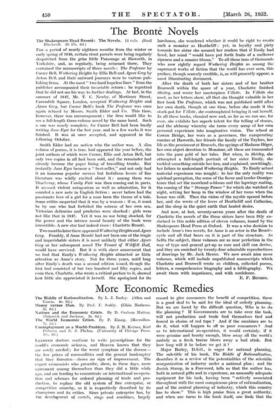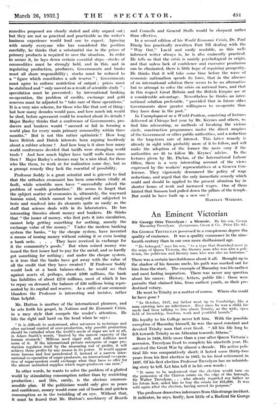More Econo mic Remedies
LEAras-En doctors continue to write prescriptions for the world's economic sickness, and Heaven knows that they are sorely needed ; for the worst symptom of the disease— the low prices of commodities and the general bankruptcy that they threaten—shows no sign of improvement. The expert economists who prescribe, show, in these days, more agreement among themselves than they did a little while ago, and are tending to concentrate on international co-opera- tion and schemes for ordered planning of trade and pro- duction, to replace the old system of free enterprise, or competitive anarchy, as it is respectively described by its champions and its critics. Since private enterprise has, by the development of cartels, rings and combines, largely
ceased to give consumers the benefit of competition, there is a good deal to be said for the ideal of orderly planning. But we are faced by the difficult question, Who is to du the planning ? If Governments are to take over the task, will not production and trade find themselves tied and bound in chains of red tape ? And if the combines are to do it, what will happen to all us poor consumers ? And as to international co-operation, it would certainly, if it were genuine and hearty enough, blow away all the world's malady as a fresh breeze blows away a bad stink. But how long will it be before we get it ?
Major Barley, D.S.O., is eager for national planning. The sub-title of his book, The Riddle of Rationalization, describes it as a review of the potentialities of the scientific reorganization of industry under a national plan ; and Sir Josiah Stamp, in a Foreword, tells us that the author has, both in natural gifts and in experience, an unusually adequate equipment for his task, having been " actively associated throughout with the most conspicuous piece of rationalization, and of the central planning of industry, which this country has to show." This is high praise from a great authority, and when one -turns to the book itself, one finds that the
remedies proposed are clearly stated and ably argued out ; but they are not as practical and practicable as the writer's business experience would lead one to expect. Agreeing with nearly everyone who has considered the position carefully, he thinks that a substantial rise in the prices of primary products is required to save the situation. In order to secure it, he lays down certain essential steps—stocks of commodities must be strongly held, and in this, and in regulating production, producers, Governments and banks must all share responsibility ; stocks must be reduced to a " figure which constitutes a safe reserve " ; Governments must agree to enforce restriction of output ; prices must be stabilized and " only moved as a result of scientific study " ; speculation must be prevented ; by international banking co-operation, the problem of credits, exchange and gold reserves must be adjusted to " take care of these operations." It is a very nice scheme, for those who like that sort of thing ; but how many decades would pass, and how much ink would be shed, before agreement could be reached about its details ? Major Barley thinks that a conference of Governments, pro- ducers and bankers would " succeed or fail in forming a world plan for every main primary commodity within three months." But is not this rather optimistic ? How long have British and Dutch interests been arguing bootlessly about a rubber scheme ? And how long is it since how many world conferences decided that tariffs were strangling world trade ? And how much higher have tariff walls risen since then ? Major Barley's schemes may be a nice ideal, for those who like them, to work at for realization some day, but as a prompt remedy they lack the essential of possibility.
Professor Soddy is a great scientist and is grieved to find that the orthodox economist has been somewhere vitally at fault, while scientific men have " successfully solved the problem of wealth production." He seems to forget that the subject matter of economics is, ultimately, the wayward human mind, which cannot he analysed and subjected to tests and resolved into its elements quite as easily as the stuff that science deals with in its laboratories. He has interesting theories about money and bankers. He thinks that " the issuer of money, who first puts it into circulation, cannot help getting something for nothing, namely the exchange value of the money." Under the modern banking system the banks, " by the cheque system, have invented a means of issuing money without coining it or even issuing a bank note. . . . They have received in exchange for it the community's goods." But when coined money was issued the first issuer had to pay for the metal, and so hardly got something for nothing ; and under the cheque system, is it true that the banks have got away with the value of all the credit that they have created ? If Professor Soddy would look at a bank balance-sheet, he would see that against assets of, perhaps, about £1100 millions, the bank has liabilities of about £270 millions, most of which it has to repay on demand, the balance of LSO millions being repre- sented by its capital and reserve. As a critic of our economic blunders the Professor is interesting and incisive, rather than helpful.
Mr. Hutton is another of the international planners, and he sets forth his gospel, in Nations and the Economic Crisis, in a racy style that compels the reader's attention. He hits the right nail hard on the head when he says :
" It is difficult to understand, after advances in technique and after national control of over-production, why possible production should be curtailed when the world's needs of sugar are not at all, in Adam Smith's words, ' limited by the narrow capacity of the human stomach.' Millions need sugar still, and millions need more of it. If the international private enterprise of sugar pro- duction regulates itself by the measuring rod of profits, it will achieve those profits by any means in its power. It would appear more human and lees paradoxical if, instead of a narrow inter- national co-operation of sugar-producers, an international co-opera- tive of sugar-needers could exchange what they have to offer for the almost unlimited supplies which sugar-producers can raise."
In other words, he wants to solve the problem of a glutted world by stimulating consumption rather than by restricting production ; and this, surely, is the obvious common- sensible plan. If the politicians would only give us peace and confidence, money would come out of hoards and quicken consumption as in the twinkling of an eye. Without that, it must be feared that Mr. Hutton's machinery of Boards and Councils and General Staffs would be eloquent rather than effective.
In a second edition of his World Ecommiie Crisis, Dr. Paul Einzig has practically rewritten Part III dealing with the " Way Out." Lucid and easily readable, as this well- infomwd writer always is, he is also eminently practical. He tells us that the crisis is mainly psychological in origin, and that unless lack of confidence and excessive pessimism can be eliminated, there is little hope of regaining prosperity. He thinks that it will take some time before the wave of economic nationalism spends its force, that in the absence of an international solution there seems to be no alternative but to attempt to solve the crisis on national lines, and that in this respect Great Britain and the British Empire are at a considerable advantage. Nevertheless he thinks an inter- national solution preferable, " provided that in future other Governments show greater willingness to co-operate than they have done in the past."
In Unemployment as a World-Problem, consisting of lectures delivered at Chicago last year by Mr. Keynes and others, we find him advocating, as methods of breaking the vicious circle, construction programmes under the direct auspices of the Government or other public authorities, and a reduction in the long-term rate of interest. This latter remedy is already in sight with probably more of it to follow, and will make the adopt' of the former the more easy if the authorities see fit to follow Mr. Keynes' advice. In the lectures given by Mr. Phelan, of the International Labour Office, there is a very interesting account of the views expressed by the workers' representatives ut a Geneva Con- ference. They vigorously denounced the policy of wage reductions, and urged that the only inunediate remedy which could and should be applied to the present situation lay in shorter hours of work and increased wages. One of them hinted that Samson had pulled down the pillars of the temple. But could he have built up a new one ?
HARTLEY WITHERS.



































 Previous page
Previous page